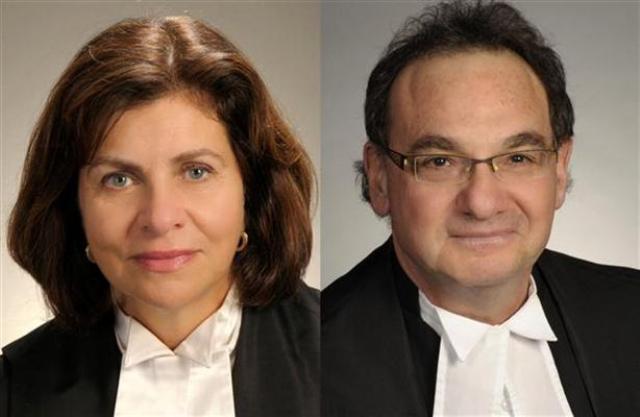OTTAWA – Two of Canada’s future Supreme Court justices revealed details about their qualifications and their personal lives, without giving any indication about their political ideology in a rare public question period on Wednesday.

Justices Andromache Karakatsanis and Michael Moldaver, both from the Ontario Court of Appeal, appeared before a special House of Commons committee tasked with assessing Prime Minister Stephen Harper’s top choices to fill the vacancies at the Supreme Court.
It’s a rare opportunity to ask questions of judges who have extraordinary power to shape Canadian laws.
The process, started in 2006 to bring more transparency to the appointment process, has been criticized by many in the legal community for opening the door to a U.S. style politicized judiciary.
American Supreme Court nominees must face a Senate committee that is free to ask questions about any controversial issue – abortion, gay marriage, gun laws – the courts will have to face in order to determine the nominee’s qualifications and ideological attitudes.
But addressing questions about the role of the courts was the closest either of the future Canadian justices got to any sort of ideological discussion on Wednesday.
Although MPs could ask anything they wished, most of the discussion focusing instead on French language skills, critiques raised by court watchers and family history.
Peter Hogg, one of Canada’s leading constitutional experts, gave the MPs clear instruction that some questions would simply not be answered.
“The most obvious category is that a judge cannot express views on cases or issues that could come before the court,” he said, adding that it might lead people to believe the judge already had a settled view on the matter before hearing the evidence.

Get breaking National news
Both candidates preemptively answered one of the most controversial questions in the Canadian legal context: how active should appointed judges be when it comes to striking down laws made by elected officials?
“Under the rule of law, it is not our function to create laws, nor do we have the right to direct governments on matters of policy. Under the Constitution, we have been given the authority to determine the legality of laws passed by Parliament and the legislatures,” said Moldaver in his opening statement.
He added that while it was important to use restraint in striking down laws, judges must be act “fearlessly” when it comes to defending the Constitution.
Karakatsanis also affirmed the role of elected officials to make public policy decisions and said that judges have the job to ensure those choices are in accordance with the Canadian Charter of Human Rights and Freedoms.
The respect expressed for lawmakers will likely play well with the Conservative government that is known to be critical of activist judges.
The NDP members on the committee spent much of their time asking Moldaver about his non-existent French skills.
In his opening statement, Moldaver apologized for his inability to speak French and pledged to learning, adding that his brother studied in France and that he would be enlisting him as a tutor.
But the NDP pushed him further, with Quebec MP Francoise Boivin asking him why he didn’t learn French earlier.
“I never expected to be here, never, ever in my wildest dreams,” he said.
NDP’s Jack Harris also pressed Moldaver to address his “reputation for discouraging Charter challenges,” – a reputation that stems from comments during a 2006 speech.
“To the extent that the label is, I have either purposefully or in its effect, tried to discourage Charter challenges, is with great respect completely wrong,” said a passionate Moldaver.
He said that he has never discouraged Charter challenges, but simply urged defence lawyers to be careful in their application of them so not to unduly slow down trials.
Karakatsanis also took on some of the critiques raised about her candidacy – including her long career as a public servant.
“I take great pride in my career as a non-partisan, professional public servant,” Karakatsanis said in her opening statement, adding that she was appointed by three political parties to dispel rumours that her time working under the Mike Harris government linked her to current federal cabinet minister Jim Flaherty and Tony Clement.
The personable judges spent a significant part of the three hour meeting talking about their pasts and their families – two things both said shaped who they are today.
Born to Greek immigrants who opened a restaurant, Karakatsanis is the first Greek-Canadian to be tapped for a Supreme Court nomination.
She said her immigrant heritage helped open her mind as a judge and develop empathy for those who are different.
Moldaver, the son of a scrap-metal worker and a homemaker, grew up in Peterborough, Ont., where he has a summer job as a road worker. He jokingly said it made him a “roads scholar” – a comment met by laughter from the MPs.
“I learned more about talking to juries from my summers on the road gang than in all my time in law school,” he said.
Both said going to university wasn’t a choice in their families, and Moldaver choked up as he spoke about how proud his late mother would be today. Karakatsanis said her excited parents were watching the proceeding on television.
Law has become the family business for both jurists, each parents of two children who are pursing careers as lawyers.







Comments